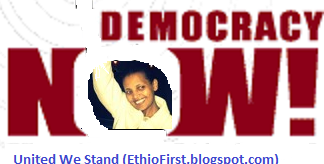Some disappeared, others were given lengthy prison sentences. One thing all thirty men arrested in 2012 in Ethiopia had in common was that they had criticised the state and the policies of the former Premier, Meles Zenawi.
And yet last week Japan's Prime Minister Shinzo Abe and a group of Japanese business leaders met with the current Prime Minister of Ethiopia, Hailemariam Desalegn to discuss further support for Ethiopia at "government and private sector level."
The former Meles Zenawi was a staunch supporter of American counter-terrorism policy while at the same time overseeing a country with a violent human rights record. In the eyes of the USA, Ethiopia is strategically situated. Located in the Horn of Africa, next to Somalia, northern Kenya and Sudan, it acts as a buffer zone between the growing Islamic extremism of Somalia and the West. As a result, the human rights violations of Zenawi were ignored.
As one of the first signatories of the UN in 1948, Ethiopia is a Western ally: 11 per cent of its entire GDP comes from Foreign Aid. The US is one of Ethiopia's largest donors: it is estimated that it gave $3.3bn in 2008 alone. The two countries benefited from their close relation: there have been rumours that America hosted "black sites" in Ethiopia; bases where the CIA interrogated undeclared prisoners during the "War on Terror."
But Meles Zenawi died in 2012. The opportunity for a more liberal government was not seized: Zenawi was replaced by Hailemariam Desalegn, described by critics as an "identikit Zenawi" running the country on "auto-pilot". Desalegn is following the same political manifesto as Meles - he hasn't changed one member of parliament.
The arena for debate and discussion is narrowing. Critics argue that Ethiopia is fast becoming a "one party democracy" where there are many parties but the same one wins again and again. Meles spoke to foreign press in 2005 and defended his 97 per cent electoral victory: "In democracies the party with the best track record remains in power." The years since 2005 have seen growing unrest among the Ethiopian population and serious repression against critics of the regime. Human Rights Watch reported that Ethiopia "continues to severely restrict freedom of movement and expression". It adds that "30 journalists and opposition members have been convicted under...vague anti-terrorism laws".
The day before World Press Freedom Day on May 2 2013, the Ethiopian government ruled to uphold the imprisonment of one of its most well-known prisoners of conscience, Eskinder Nega. He was jailed for being a journalist who criticised the government, and yet, by standing up for his beliefs and expressing his basic human right for Freedom of Speech, he earned an 18 year jail sentence.
Prime Minister Hailemariam Desalegn has denied his release. America and Britain have done little to challenge their ally, so worried are they about creating another enemy in the Horn of Africa. Britain and America have consistently failed to challenge their ally about its abhorrent Human Rights record. Ethiopia flaunts its apathy towards the UN convention of Human Rights, denying opposition members a right to fair trial and repressing people for trying to voice their opinions peacefully.
Ethiopian political repression is worsening. There have been repeated crackdowns against the country's Muslim minority. This has included arbitrary arrests as Muslims make peaceful demands for freedom of worship. Again, critics have voiced concern with the regime. Mehari Taddele Maru, head of the African Conflict Prevention Program at the Institute for Security Studies expressed concern that "if legitimate grievances are not met then there is a risk that extremist violent elements will exploit those grievances to further their own."
The world is waking up to Ethiopia's increasingly poor human rights track record and yet the United States hasn't stopped aid flowing to Ethiopia or threatened the country with sanctions. Japan still tries to conduct business with Ethiopia when instead they should be holding Ethiopia to account.
As a founding member of the UN and an "ally" of the West, Ethiopia must be held accountable for her crimes. If the West does not challenge Ethiopia and demand that it releases its prisoners who have been locked up without fair trial, then notions of democracy and human rights accountability as embedded in the Human Rights Charter look ever more vulnerable-Human Rights globally will be laughed out of the door.

